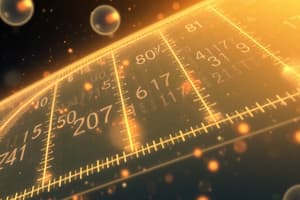Podcast
Questions and Answers
Why are standardized units of measurement essential for effective communication of experiences and observations?
Why are standardized units of measurement essential for effective communication of experiences and observations?
- They offer a qualitative assessment of experiences.
- They provide a subjective interpretation of natural phenomena.
- They provide a common, quantifiable way to express experiences, reducing ambiguity. (correct)
- They limit the need for precise measuring devices.
What is the primary reason for avoiding overly precise estimations in measurement?
What is the primary reason for avoiding overly precise estimations in measurement?
- To reflect the inherent limitations of measuring abilities and avoid misleading claims of accuracy. (correct)
- To simplify calculations and reduce complexity.
- To encourage more subjective interpretations of data.
- To align with arbitrary standards of measurement.
A student measures the length of a table using a ruler marked in centimeters. The measurement is recorded as 125.3 cm. What does this imply about the precision of the measurement?
A student measures the length of a table using a ruler marked in centimeters. The measurement is recorded as 125.3 cm. What does this imply about the precision of the measurement?
- The student is certain about the length, including the sub-millimeter.
- The student estimated the length to the nearest millimeter.
- The student used a measuring device with millimeter markings and precisely measured to this level.
- The student is certain about the length up to the nearest centimeter and estimated the millimeter. (correct)
Consider the number 0.004020. How many significant figures does it contain?
Consider the number 0.004020. How many significant figures does it contain?
A surveyor measures a plot of land to be approximately 20,000 square feet. Expressing this measurement with one significant figure implies what range of area?
A surveyor measures a plot of land to be approximately 20,000 square feet. Expressing this measurement with one significant figure implies what range of area?
When adding or subtracting measurements, what determines the number of decimal places in the final answer?
When adding or subtracting measurements, what determines the number of decimal places in the final answer?
What determines the number of significant figures in the result of a multiplication or division operation?
What determines the number of significant figures in the result of a multiplication or division operation?
A rectangle's sides are measured to be 12.5 cm and 8.34 cm. What is the area, reported with the correct number of significant figures?
A rectangle's sides are measured to be 12.5 cm and 8.34 cm. What is the area, reported with the correct number of significant figures?
A student measures the mass of an object three times and obtains the following values: 15.25 g, 15.27 g, and 15.26 g. What is the average mass, reported with the correct number of significant figures?
A student measures the mass of an object three times and obtains the following values: 15.25 g, 15.27 g, and 15.26 g. What is the average mass, reported with the correct number of significant figures?
If a liquid's volume is measured to be 25.0 mL in a graduated cylinder, what does the '0' after the decimal point indicate?
If a liquid's volume is measured to be 25.0 mL in a graduated cylinder, what does the '0' after the decimal point indicate?
A rope is measured to be 1.5 meters long. If you need to cut the rope into 3 equal pieces, what is the length of each piece, reported with the correct number of significant figures?
A rope is measured to be 1.5 meters long. If you need to cut the rope into 3 equal pieces, what is the length of each piece, reported with the correct number of significant figures?
What is the area of a circle with a radius of 3.2 cm, reported with the correct number of significant figures?
What is the area of a circle with a radius of 3.2 cm, reported with the correct number of significant figures?
A car travels 155 miles in 3.0 hours. What is the average speed of the car, reported with the correct number of significant figures?
A car travels 155 miles in 3.0 hours. What is the average speed of the car, reported with the correct number of significant figures?
What do significant figures primarily indicate about a measurement?
What do significant figures primarily indicate about a measurement?
A graduated cylinder contains 35.0 mL of water. An object is submerged, and the water level rises to 42.5 mL. What is the volume of the object, considering significant figures?
A graduated cylinder contains 35.0 mL of water. An object is submerged, and the water level rises to 42.5 mL. What is the volume of the object, considering significant figures?
If you have a measurement of 1500 grams, how can you express it to show that it has two significant figures?
If you have a measurement of 1500 grams, how can you express it to show that it has two significant figures?
What is the result of $145.67 + 2.3$, reported with the correct number of significant figures?
What is the result of $145.67 + 2.3$, reported with the correct number of significant figures?
What is the area of a square with sides measuring 2.5 cm, reported to the correct number of significant figures?
What is the area of a square with sides measuring 2.5 cm, reported to the correct number of significant figures?
A recipe calls for 1.5 cups of flour, 0.75 cups of sugar, and 2.25 cups of liquid. What is the total volume of ingredients, reported with the appropriate number of significant figures?
A recipe calls for 1.5 cups of flour, 0.75 cups of sugar, and 2.25 cups of liquid. What is the total volume of ingredients, reported with the appropriate number of significant figures?
A laboratory technician measures out 50 mL of a solution using a graduated cylinder. How many significant figures are in this measurement?
A laboratory technician measures out 50 mL of a solution using a graduated cylinder. How many significant figures are in this measurement?
Flashcards
Units of Measurement
Units of Measurement
Quantifying experiences and observations using standardized quantities.
Significant Figures
Significant Figures
Indicate the precision of a measurement; follow specific rules to determine which digits are meaningful.
Sig Fig Rule 1
Sig Fig Rule 1
All non-zero digits are significant.
Sig Fig Rule 2
Sig Fig Rule 2
Signup and view all the flashcards
Sig Fig Rule 3
Sig Fig Rule 3
Signup and view all the flashcards
Sig Fig Rule 4
Sig Fig Rule 4
Signup and view all the flashcards
Sig Figs: Adding/Subtracting
Sig Figs: Adding/Subtracting
Signup and view all the flashcards
Sig Figs: Multiplying/Dividing
Sig Figs: Multiplying/Dividing
Signup and view all the flashcards
Rounding Rule
Rounding Rule
Signup and view all the flashcards
Study Notes
- Humans communicate experiences through measurement.
- Units of measurement help quantify experiences and observations.
- Some units relate to natural phenomena (day, year), others are arbitrary (length, mass).
- Measurement has limitations, and precision is relative to measuring abilities.
- Overly precise estimations should be avoided.
- Measuring devices allow estimation of one digit beyond inherent precision.
Significant Figures (Sig Figs)
- Sig figs indicate the precision of a measurement.
- Rule 1: Non-zero digits are always significant.
- Rule 2: Zeros between non-zero digits are significant.
- Rule 3: Leading zeros are not significant.
- Rule 4: Trailing zeros are significant only if they are decimal zeros.
- 10,000 has one sig fig, meaning "about 10,000".
- An estimate of 10,000 with one sig fig means a range from 9,500 to 10,499.
Calculations with Sig Figs
- Adding/subtracting: Answer has as many decimal places as the value with the least decimal places.
- Multiplying/dividing: Answer has as many sig figs as the value with the least sig figs.
- Rounding: 5 or higher rounds up, 4 or below rounds down at the appropriate digit.
Studying That Suits You
Use AI to generate personalized quizzes and flashcards to suit your learning preferences.




